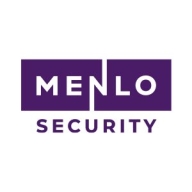

Menlo Secure and Google Cloud Platform Cloud Identity-Aware Proxy compete in the cybersecurity space. Menlo Secure is favored for support and pricing, while Google Cloud Platform Cloud Identity-Aware Proxy boasts robust features, offering value for its cost.
Features: Menlo Secure offers advanced threat prevention, web isolation, and email link rewriting to enhance security. Google Cloud Platform Cloud Identity-Aware Proxy is noted for its seamless identity management, integration capabilities, and cloud-based security protocols, making it suitable for comprehensive security needs.
Room for Improvement: Menlo Secure could enhance logging capabilities, and address bypass issues for specific sites while maintaining user authentication. Google Cloud Platform Cloud Identity-Aware Proxy could improve user-friendliness, reduce technical complexity for new users, and enhance the integration process with non-Google services.
Ease of Deployment and Customer Service: Menlo Secure is known for simple deployment and exceptional customer service, facilitating quick user integration. Google Cloud Platform Cloud Identity-Aware Proxy provides deployment flexibility and robust support, though it may require a higher level of technical expertise.
Pricing and ROI: Menlo Secure delivers a cost-effective setup with rapid implementation, providing satisfactory ROI. Google Cloud Platform Cloud Identity-Aware Proxy demands a higher upfront investment but offers a greater long-term ROI through its extensive features and adaptiveness, fitting larger organizational requirements.


Google’s mission is to organize the world‘s information and make it universally accessible and useful.
Since our founding in 1998, Google has grown by leaps and bounds. From offering search in a single language we now offer dozens of products and services—including various forms of advertising and web applications for all kinds of tasks—in scores of languages. And starting from two computer science students in a university dorm room, we now have thousands of employees and offices around the world. A lot has changed since the first Google search engine appeared. But some things haven’t changed: our dedication to our users and our belief in the possibilities of the Internet itself.
Menlo Security Secure Application Access
Menlo Security Secure Application Access makes zero trust access easy, giving users secure connectivity to private applications, including web and legacy applications. At the core of Secure Application Access is the Menlo Secure Cloud Browser, which fetches, secures and delivers the content for users.
In addition to providing simple-to-deploy, clientless ZTA, Secure Application Access and the Menlo Secure Cloud Browser protect applications from attacks such as session hijacking, cookie manipulation, and other tactics that employ protocol manipulation.
Secure Application Access protects applications from Internet threats and provides granular controls for added protection of the application and associated data. These security controls include Read-only/Read-write, Upload/download, Copy/paste, AV scanning, Sandboxing, and Data Loss Prevention.
Last Mile Data Protection
Menlo Last-Mile Data Protection identifies and prevents sensitive data from leaving your company by meticulously inspecting all file uploads and user input across browsing sessions. Leveraging the Secure Cloud Browser, users are protected from the internet and you can protect your organization from data loss with comprehensive traffic monitoring and controls. This approach addresses the growing concerns surrounding data leakage in the age of AI tools like ChatGPT.
By identifying sensitive data through file types, regular expressions, or predefined libraries, Menlo Last-Mile Data Protection empowers security teams to regulate data input into AI platforms and prevent unauthorized uploads. This capability provides crucial protection for intellectual property, PII, and other confidential information.
The solution leverages the Menlo Cloud Security Platform's visibility and control over traffic to reliably detect and prevent data leaks originating from both browser submission forms and non-browser traffic. With the ability to inspect encrypted web traffic, Menlo Last-Mile Data Protection enforces DLP policies consistently across all users and devices, ensuring comprehensive data protection.
We monitor all ZTNA reviews to prevent fraudulent reviews and keep review quality high. We do not post reviews by company employees or direct competitors. We validate each review for authenticity via cross-reference with LinkedIn, and personal follow-up with the reviewer when necessary.